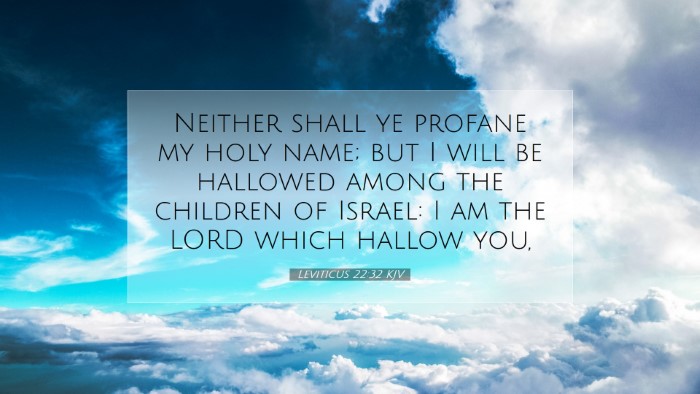Commentary on Leviticus 22:32
Verse Context: Leviticus 22:32 states, “And ye shall not profane my holy name; but I will be hallowed among the children of Israel: I am the LORD which hallow you.” This verse arises from the comprehensive laws concerning the sacrificial offerings and the holiness required in worship, specifically focusing on the sanctity of God's name.
Interpretative Overview
This commandment underscores the gravity of maintaining reverence for God and His sacred name. The theological implications are significant; it denotes God's unwavering holiness and the expectations He has for His people in their reverence towards Him.
Theological Insights
1. The Holiness of God: The verse encapsulates the essential nature of God as holy. As cited by Matthew Henry, the core message is that God's name represents His character—His holiness should not be diluted or treated with irreverence. The name 'LORD' (YHWH) invokes thoughts of God’s covenantal relationship with Israel, further emphasizing His holiness.
2. Profaning the Name: According to Albert Barnes, to "profane" God’s name signifies to treat it casually, with a lack of respect that could lead people to misunderstand God's character. When Israel soiled His name through disobedience or disrespect, it not only affected their relationship with God but also their witness to the surrounding nations.
3. The Mandate to Hallow: The command “I will be hallowed” communicates an active role of the community in promoting God’s holiness. As noted by Adam Clarke, this reflects the responsibilities of the Israelites to uphold God’s standards in their worship and lifestyle, culminating in the glorification of His name.
Practical Applications
For pastors, students, and theologians, Leviticus 22:32 offers several practical insights:
- Reverence in Worship: The church today is encouraged to foster an environment of reverence, ensuring that worship practices and the congregation’s conduct align with the holiness of God.
- Teach God’s Holiness: Educators and pastors are challenged to teach their congregations about the divine nature of God and the significance of upholding His name, both in word and deed.
- Cultural Witness: Just as ancient Israel served as a witness to other nations, Christians are called to uphold God's name in a way that reflects His character, thereby drawing others to Him.
The Implications of Hallowing God’s Name
God's insistence on being hallowed serves to remind believers that there are consequences tied to honor and dishonor. As God’s name is intertwined with His reputation among the nations, neglecting this command can lead to disastrous outcomes both privately and communally. Matthew Henry posits that dishonoring God's name may ultimately reflect back upon the character of God's people, jeopardizing their mission and purpose.
Interpersonal Relationship with God
This scripture also directs believers to consider their interpersonal relationships with God. When God’s name is treated with the utmost respect, there arises a deeper understanding of connection with the Divine. Albert Barnes emphasizes that the acknowledgment of God’s holiness leads to a more profound reverential fear—a critical component of a vibrant faith life.
Concluding Thoughts
In summary, Leviticus 22:32 pronounces a fundamental truth about the necessity of reverencing God's name and the calling upon God’s people not merely to acknowledge his holiness but to actively participate in hallowing it within their lives. This call carries applications that transcend time and culture, urging all believers to cultivate a lifestyle that honors God appropriately.
As Adam Clarke reflects, the importance of maintaining God’s holiness is eternal. Therefore, our lives, worship, and communities should serve as testimonies to the sacredness of God’s name, continually pointing others to His glory and grace.


